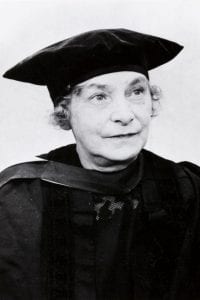By Judith Squires, Pro Vice-Chancellor for Education

Last night was a historic evening for the University as we unveiled a special series of portraits in the Wills Memorial Building. Never before have women graced the walls of the Great Hall, which has more recently been a space for hanging portraits of our former Vice-Chancellors.
Although we’ve never had a female Vice-Chancellor, many incredible women have helped to shape the University and, indeed, the world. So, in the year which marks a centenary since the first British women won the vote, we wanted to redress the balance by celebrating these educators, pioneers and activists.
As we were the first higher education institution in England to welcome women on an equal basis to men, it’s only fitting that the many visitors to the Great Hall see that the University is proud of the achievements of the inspirational women that have shaped our history and continue to shape our future.
From our first woman lecturer to the first British woman to have won a Nobel Prize, these notable women now take their rightful place on the walls of our most prestigious building. Although the achievements of women such as Lady Hale, Professor Jean Golding and Professor Dorothy Hodgkin have been rightly honoured – both in the University and more widely – in the past, we also wanted to uncover the stories of unsung heroines, whose achievements aren’t as well-known as they should be.
Current staff, students and alumni whose research, learning or work connects them to these women share their thoughts on their lives, careers and legacies in this online gallery.

I’m photographed holding an image of Winifred Shapland. Not only was Winfred the Registrar here for nearly 20 years (1931 to 1950), she was the first female Registrar of any British university. Winfred held this, the most senior professional services role, at a time when universities were led almost exclusively by men. She was a pioneer in the world of higher education, and I am proud the University of Bristol showed its commitment to gender equality from its earliest days by appointing her to the role.
Working with our Special Collections Library, we were able to unearth the address given by former Vice-Chancellor, Sir Philip Morris, at her memorial service which gave us an insight into her life, of which she devoted over 40 years to the University. Although she was known to abhor personal recognition and publicity, we feel that marking her legacy in this way is important; reflecting the University’s early and continuing commitment to gender equality and showing generations of women who followed her in higher education that no job is beyond their reach.
Winifred and the other nine women featured are just a handful of the many remarkable women who have made, and continue to make, Bristol truly great. Featuring them alongside ten women in today’s University community gave us the opportunity to show how their legacy is continuing to inspire our study, teaching and work today, while also showcasing our current pioneers.
This project will be the first of many initiatives to honour our women in the Wills Memorial Building and more widely across the University, with new permanent artworks to be commissioned every year until 2028: the 100-year anniversary of full suffrage in Britain, when all women over 21 were given the right to vote, not just those over the age of 30 who owned property.
Much has changed since those brave women fought for their rights and the rights of future generations of women. As a University, we pledge to ensure their legacy lives on and we urge all our students, staff and alumni to work together as we strive further towards equality. Please look at our Vote 100 campaign online and continue to share your thoughts on social media using #BristolUniWomen.
